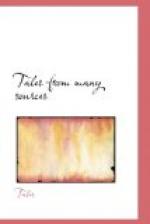But to John Broom and the cowherd no subject was so interesting as that of the Lubber-fiend. The cowherd sighed to think of the good old times when a man might sleep on in spite of cocks, and the stables be cleaner, and the beasts better tended than if he had been up with the lark. And John Broom’s curiosity was never quenched about the rough, hairy Good-fellow who worked at night that others might be idle by day, and who was sometimes caught at his hard earned nap, lying “like a great hurgin bear,” where the boy loved to lie himself, before the fire, on this very hearth.
Why and where he had gone, Thomasina could not tell. She had heard that he had originally come from some other household, where he had been offended. But whether he had gone elsewhere when he forsook Lingborough, or whether “such things had left the country” for good, she did not pretend to say.
And when she had told, for the third or fourth time, how his porridge was put into a corner of the cowhouse for him over night, and how he had been often overheard at his work, but rarely seen, and then only lying before the fire, Miss Betty would ring for prayers, and Thomasina would fold up her knitting and lead the way, followed by Annie the lass, whose nerves John Broom would startle by treading on her heels, the rear being brought up by the cowherd, looking hopelessly at his boots.
Miss Betty and Miss Kitty did really deny themselves the indulgence of being indulgent, and treated John Broom on principles, and for his good. But they did so in their own tremulous and spasmodic way, and got little credit for it. Thomasina, on the other hand, spoiled him with such a masterful managing air, and so much sensible talk, that no one would have thought that the only system she followed was to conceal his misdemeanours, and to stand between him and the just wrath of the farm-bailiff.
The farm-bailiff, or grieve, as he liked to call himself, was a Scotchman, with a hard-featured face (which he washed on the Sabbath), a harsh voice, a good heart rather deeper down in his body than is usual, and a shrewd, money-getting head, with a speckled straw hat on the top of it. No one could venture to imagine when that hat was new, or how long ago it was that the farm-bailiff went to the expense of purchasing those work-day clothes. But the dirt on his face and neck was an orderly accumulation, such as gathers on walls, oil-paintings, and other places to which soap is not habitually applied; it was not a matter of spills and splashes, like the dirt John Broom disgraced himself with. And his clothes, if old, fitted neatly about him; they never suggested raggedness, which was the normal condition of the tramp-boy’s jacket. They only looked as if he had been born (and occasionally buried) in them. It is needful to make this distinction, that the good man may not be accused of inconsistency in the peculiar vexation which John Broom’s disorderly appearance caused him.




